Editor:
Brandon Sweet
University Communications
bulletin@uwaterloo.ca
Celebrating Waterloo's Class of 2022 valedictorians, Part Two

This is the second installment of an article originally published on Waterloo News. Check out Part One from Friday.
Convocation is a special time to celebrate a significant milestone. For the first time in two years, the University of Waterloo invites the graduating class to celebrate their accomplishments in front of families and friends during the in-person celebrations throughout the week.
These students have been selected by their peers, in recognition of their social and academic contributions to the Waterloo community, to represent the graduating class at their respective ceremonies.
Faculty of Health
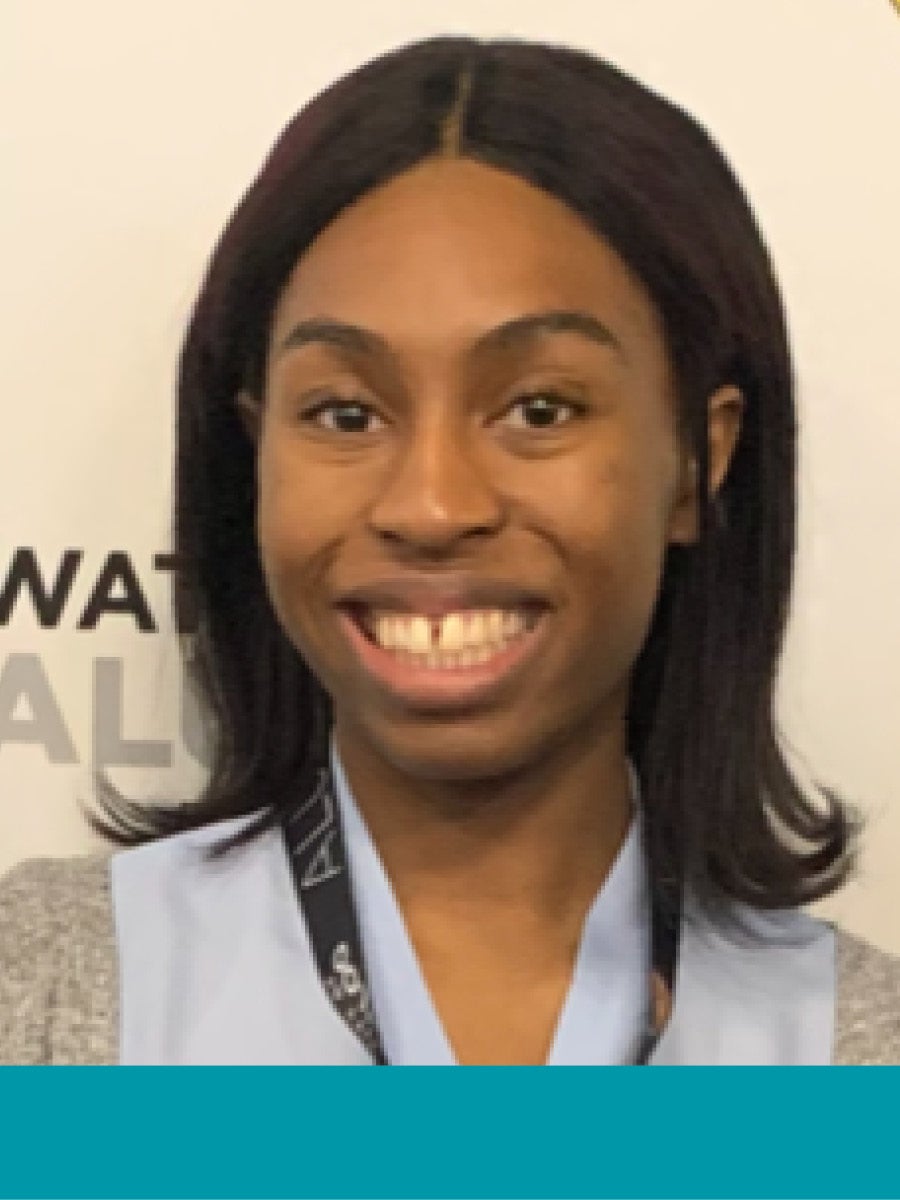
When it was time for Precious Nwaka (BSc ’22) to decide on a program, she was convinced that Waterloo’s Health Studies program was the right choice. Nwaka recalls getting accepted into Waterloo as a moment that changed her life and was excited to dive into the program that integrates health, life and social science — a mixture of all three topics she loved.
Nwaka remembers failing her CHEM 123 final exam as one of her fondest memories during her first year at Waterloo. The memory taught her a lesson that she feels is important for other students to recognize. “At the time, I thought that any schools I would apply in the future would overlook me because of that grade,” Nwaka says. “But then it taught me that despite any challenges or failures I may experience, as long as there is tomorrow, I can overcome them.”
Nwaka overcame adversity through hard work and determination which opened pathways to some of her greatest achievements. While at Waterloo, Nwaka was involved in the Foundation for International Medical Relief of Children, the UW African Student Association, the Pre-Med Society, and the Journal of Undergraduate Health Research. She successfully published articles which includes an opinion piece on COVID-19 vaccinations and her honours thesis on the association between menstrual experiences and self-esteem in Canadian youth.
After graduation she is focusing on a career around patient-centered care from a pharmaceutical perspective. “I know that I want to work with people and use my expertise to help them live healthier and happier lives.”
Nwaka is graduating with a Bachelor of Science in Health Studies and a specialization in Health Research.
Faculty of Mathematics
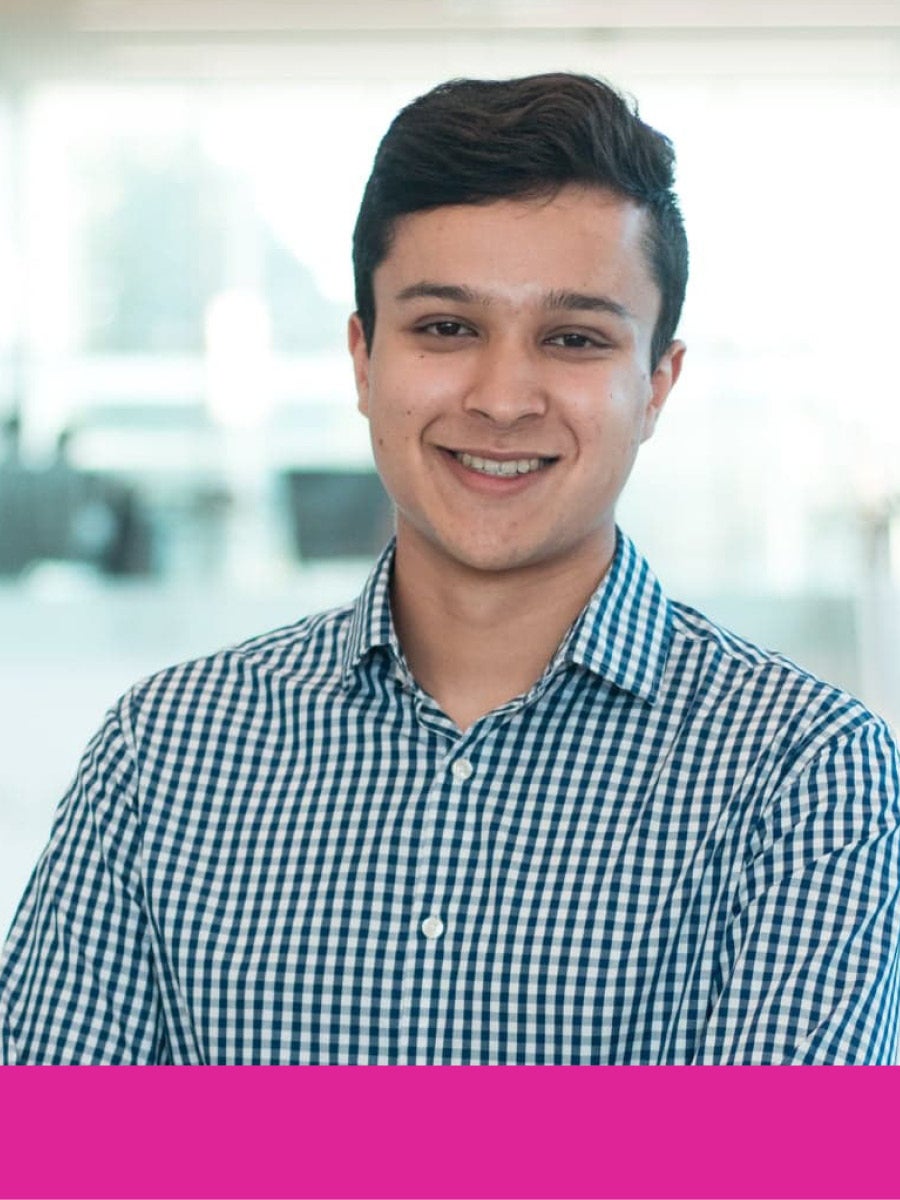
After completing high school in Quebec, Farzaan Nathoo-Khedri (BMATH ’22) knew the Faculty of Mathematics at Waterloo was the place for him.
“Enrolling at the University of Waterloo was a no-brainer,” Nathoo-Khedri says. “The University has an incredible reputation both in Canada and internationally, and one of the most driven and passionate student communities in the world.”
Nathoo-Khedri immersed himself in many areas of campus life, including his time as a student ambassador, an orientation leader, a math tutor, participated in various intramural sports, and held different positions with the Actuarial Science Club — later becoming president in his final year.
The community of students, faculty and staff helped make Waterloo feel like a second home for Nathoo-Khedri. He feels confident that he will stay in touch with so many amazing people who shaped his student experience.
After graduating with his Bachelor of Mathematics in Actuarial Science, Nathoo-Khedri has moved to San Francisco, where he's working full-time as an actuarial analyst at Lyft. “I hope to continue acquiring new skills and challenging myself in new settings as I believe that one’s educational journey and self-growth never truly stops.”
Faculty of Science
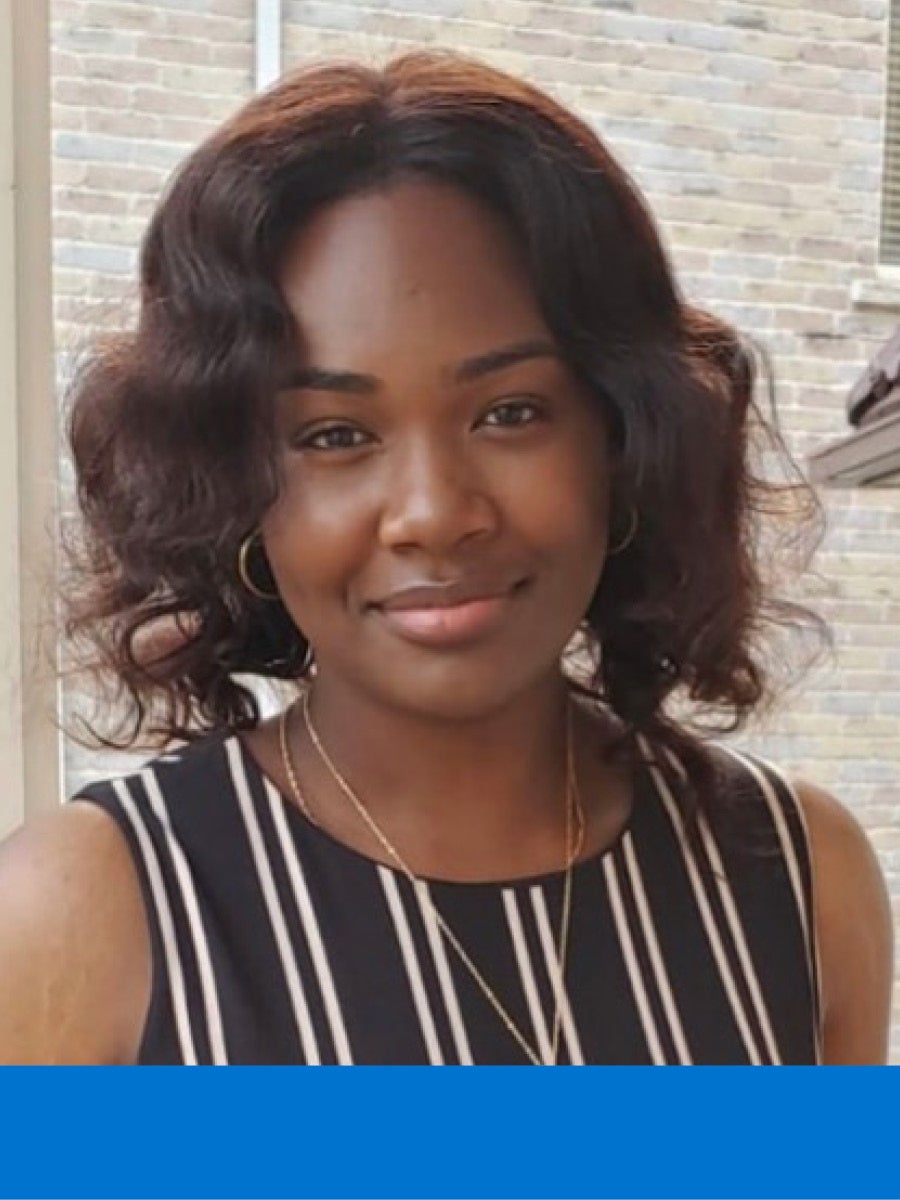
When Aisosa Laura Ohiegbomwan (BSc ’22) first visited campus during open house, she discovered the Biomedical Science program was a gateway to professional school which aligned with her goals.
One of her fondest memories was moving into residence, where Ohiegbomwan remembers feeling excited and optimistic to meet new people. She remained involved on campus by participating in the UW Pre-Pharmacy Club and the UW Supporting Heart and Stroke Club.
Ohiegbomwan admits being chosen as valedictorian not only validates her capabilities in writing, communicating and presenting, but also shows her growth in finding confidence in herself.
“Graduating from university is of course a great achievement,” Ohiegbomwan says. “But becoming valedictorian is what I am particularly most proud of because I am the first of my siblings to do so.”
Ohiegbomwan is graduating with a Bachelor of Science in Biomedical Science. She looks forward to the next step of her journey by finding work, gaining experience and building valuable connections with others that she can use in her applications to professional school.
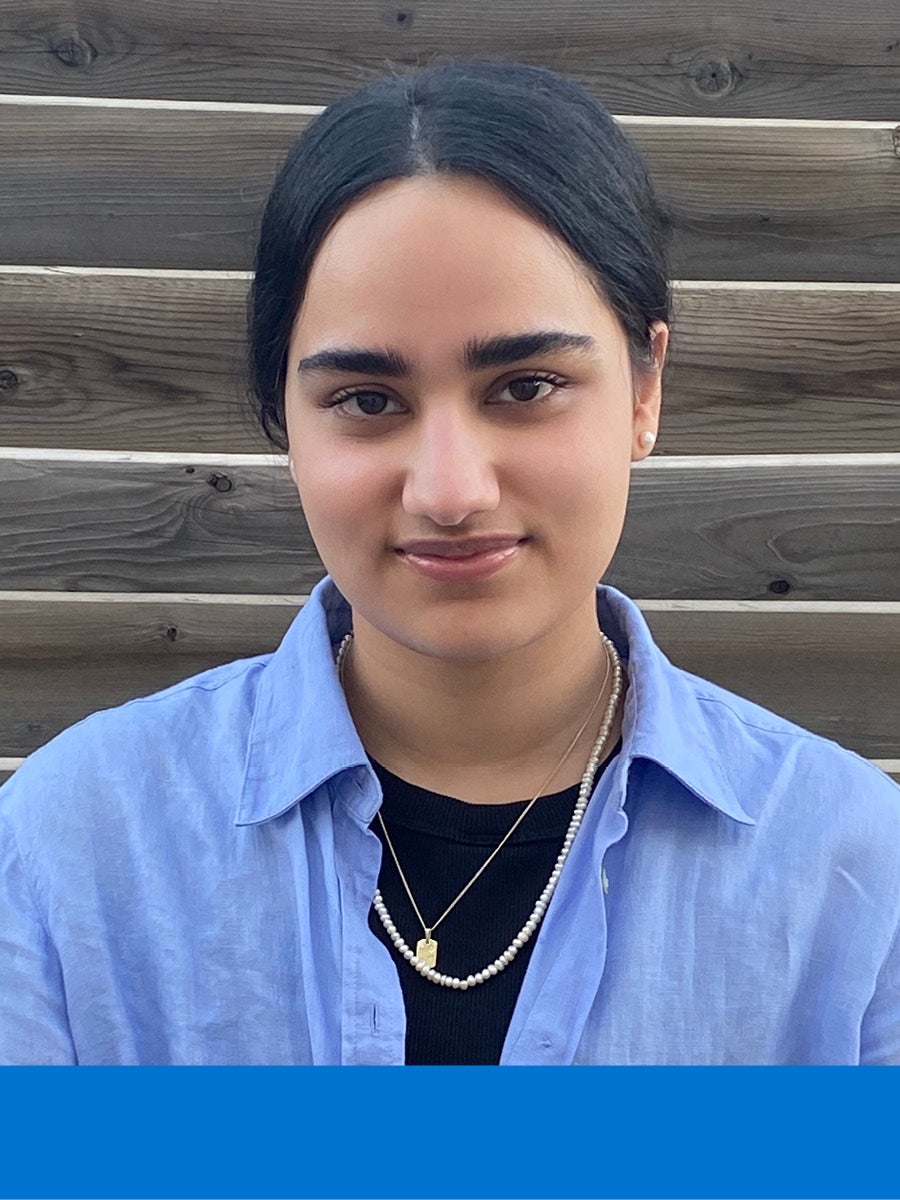
While Marya Talha (BSc ’22) moved abroad to study at Waterloo, she instantly felt a sense of community in her new home. Talha admires the student community at Waterloo for being open to experimenting and following their passions, which motivated her to do the same.
“I will miss the flexibility which enabled me to follow my curiosities at the University of Waterloo,” Talha says. “Halfway through my undergrad, I developed an interest in understanding the Latin roots of biology terminology better. I simply began to take courses in the Classical Studies department and later developed the interest into a full-fledge minor.”
Talha not only feels very fortunate to complete her degree but also having the honour to be selected as valedictorian, where she will be able to tell her story and connect with the wider student community one last time.
Talha feels very fortunate when reflecting on her accomplishments, such as being an orientation leader, a library ambassador and the founder of University’s Bioethics Society, a club she founded during the COVID-19 crisis. She will be continuing her advocacy for health care issues by diving deeper into the field of bioethics and health equity within her community.
Talha is graduating with a Bachelor of Science and a double minor in Biology and Classical Studies.
Provost establishes Council of Academic Leaders
Vice-President, Academic & Provost James W.E. Rush has convened a new group to bring together academic leaders on campus.
In addition to the President and Vice-President Academic & Provost, the Council of Academic Leaders (CAL) is made up of: Presidents/Principals of AFIWs, Vice-Presidents, Deans, Associate Deans, Chairs and Directors, and other members of Executive Council. The CAL will support broader awareness and coordination among leaders.
“The CAL will be a forum for discussion of issues or developments shaping strategic directions and important high level operational items, as well as for annual updates on planning topics of widespread interest and impact,” Provost Rush wrote in a memo circulated to academic leaders in early May.
“The breadth of the CAL membership will help ensure that the context surrounding issues of strategic and high level operational importance are widely understood and informed.” Provost Rush explained.
The CAL had its inaugural meeting on Tuesday, May 31, 2022, and will reconvene in October 2022.
The Council will generally meet four-six times during the academic year, and will also be connected by a regular targeted digest from the Provost’s Office consolidating communications and information of relevance to the group as a vehicle for maintaining the network across this broad group of academic leadership.
Funding the future of 2D materials

This article was originally published on Waterloo News.
A key puzzle piece fell into place last Thursday with the announcement of $1.65 million in federal funding for a joint training program involving the University of Waterloo and partners in Germany.
Support from the Natural Sciences and Engineering Research Council of Canada (NSERC) gives the green light to a nine-year initiative to train dozens of graduate students and help bring promising new two-dimensional materials out of the laboratory and into the marketplace.
Five years in the making, the collaboration involves experts at the University of Duisburg-Essen and RWTH Aachen University, and eight engineering and chemistry professors at Waterloo in a project dubbed 2D-MATURE.
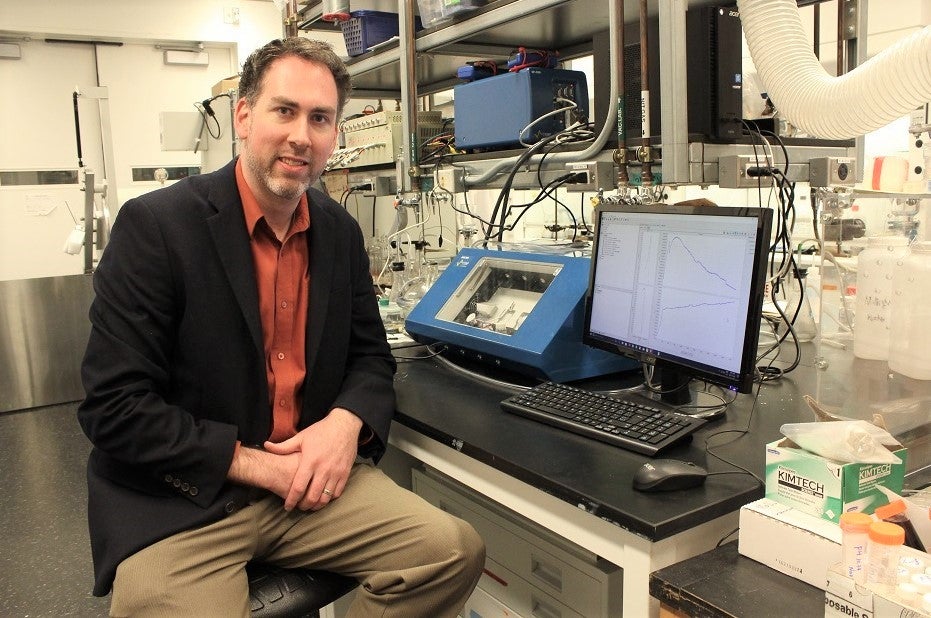
Michael Pope is leading an international initiative to provide graduate students with the skills to help commercialize two-dimensional materials.
Through workshops, international exchanges and industry partnerships, the objective is to provide almost five dozen graduate students in Canada, and a similar number in Germany, with the know-how to scale up the production of 2D materials and make them commercially viable.
“We have found, I think, that perfect collaborative fit – and it’s the right time,” said Michael Pope, a chemical engineering professor who is leading the initiative for Waterloo. “We’re at the right research-versus-commercialization phase in 2D materials development.”
Two-dimensional materials such as graphene - the first one to be discovered by Nobel Prize-winning researchers - can be made as thin as a single layer of atoms.
That gives them special properties, such as extremely high surface area, and a wide range of potential uses including in transistors for high-speed computers, smaller, lighter, longer-lasting batteries, and composite tennis racquets.
'A little goes a long way'
“A little bit goes a long way,” Pope said of the early tennis racquet application. “Essentially, you can replace other materials that were used for strengthening with a much smaller amount and get higher performance.”
Engineers and scientists around the world are now searching for other materials that can be fabricated in 2D – there are believed to be about 2,000 of them – and developing ways to economically produce them in sufficient quantities for commercialization.
Students in the 2D-MATURE program will also learn about business-related subjects such as intellectual property laws, and the impact of mining for precursor materials on Indigenous people in areas including Northern Ontario and Quebec.
With cash and in-kind support from the University of Waterloo, funding for the Canadian researchers is over $4 million. The federal support was awarded through NSERC’s Collaborative Research and Training Experience (CREATE) program.
'We're hoping to bridge that gap'
The other professors involved at Waterloo are Zhongwei Chen in chemical engineering, Na Young Kim and Irene Goldthorpe in electrical and computer engineering, Kyle Daun and Kevin Musselman in mechanical and mechatronics engineering, and German Sciaini and Rodney Smith in chemistry.
Pope said researchers at Waterloo and Duisburg-Essen have complementary expertise, and both schools feature established nanotechnology institutes. The idea for the project began taking shape at a workshop hosted by the Waterloo Institute for Nanotechnology about five years ago.
“It’s going to be a lot of work, but it’s going to be a lot of fun as well, and it will really elevate my research program and those of my colleagues here,” said Pope, who is seeking applications from graduate students interested in the specialized program.
“It’s difficult to go from the lab to commercialization because there are so many nuances along the way that must be understood as you scale up. We’re hoping to bridge that gap between research and the commercial use of 2D materials.”
Participants needed for eye problems in concussed children (EPICC) study
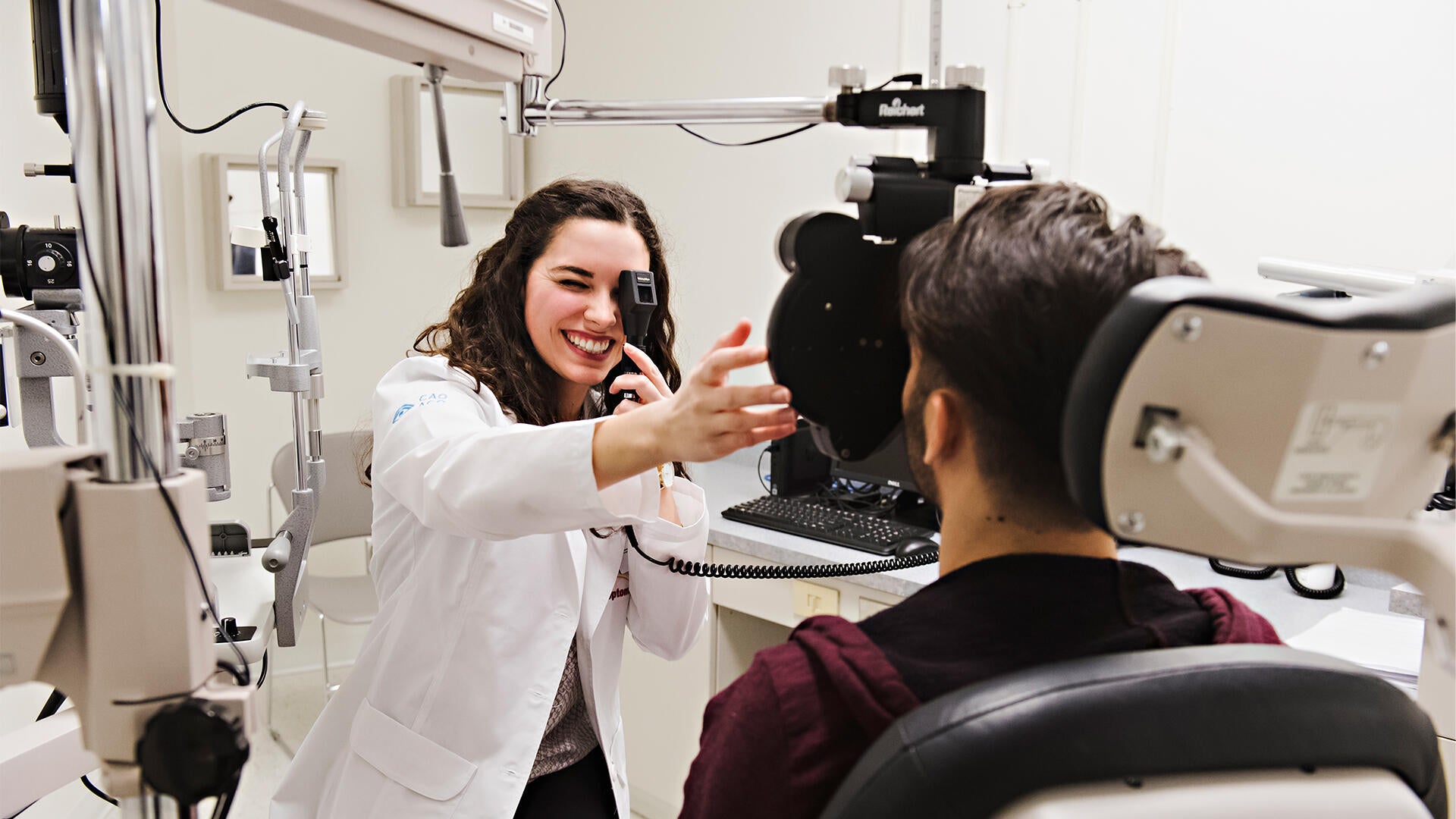
A message from the School of Optometry & Vision Science.
We are looking for adolescents less than 18 years old who are in good health for a study evaluating the effects of concussion on vision in children. Participants will be asked to complete a comprehensive set of vision tests over the span of 2 to 3 visits.
Eligibility: 1) Concussion Group: Children and adolescents (12 - 17.5 years old) who have had a diagnosis of concussion within the last 10 +/- 5 days; 2) Control Group: Children and adolescents (12 - 17.5 years old) in good health, with good vision and no history of diagnosed concussion or traumatic brain injury.
Time commitment: 1) Concussion Group: 1 medical visit after injury and 3 vision visits approximately 10, 30 and 90 days post-injury. 2) Control Group: 2 vision visits (90 days apart). Your child will receive $30 for the first visit and $20 for second visit. All vision visits are 2 to 3 hours long, and parking costs for all participants will be reimbursed if needed.
To participate, please contact Dania Abuleil at dania.abuleil@uwaterloo.ca.
Monday's notes
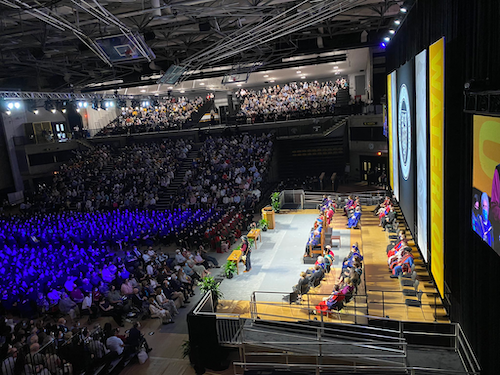
It's good to have you back: graduating classes of 2020 and 2021 were welcomed back to campus for special celebration events this weekend.

Design Thinking with a product designer: "Matt Neill knows how to solve problems with design," says a note from Velocity. "He's a product designer at Faire, a Velocity alumni company that empowers entrepreneurs world-wide. Join us to hear from Neill as he shares how to translate user insights into actionable steps that solve problems for your customers. A user-centric approach will ensure you can build inspired products that your customers will love. Opportunity for Q&A."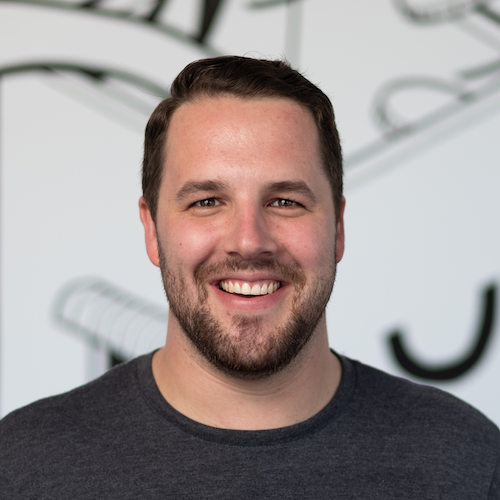
"Neill is also a Concept Coach and was the co-founder of POET, a digital signage startup for three years. He is experienced in UI design and front-end development. His expertise is software, prototyping, design, customer discovery and problem/idea formulation."
Join Velocity on Tuesday, June 14 from 6:00 p.m. to 7:00 p.m. online or in-person for this free event. Register to attend.
Link of the day
International Albinism Awareness Day
When and Where to get support
Students can visit the Student Success Office online for supports including academic development, international student resources, immigration consulting, leadership development, exchange and study abroad, and opportunities to get involved.
Instructors looking for targeted support for developing online components for blended learning courses, transitioning remote to fully online courses, revising current online courses, and more please visit Agile Development | Centre for Extended Learning | University of Waterloo (uwaterloo.ca).
Instructors can visit the Keep Learning website to get support on adapting their teaching and learning plans for an online environment.
Course templates are available within your course in LEARN to help you build and edit your content and assignment pages quickly.
The following workshops, webinars, and events are offered by the KL team (CTE, CEL, ITMS, LIB):
-
Scholarship of Teaching and Learning (SoTL) Methods – self-directed, continuous self-enrollment course in LEARN.
-
Independent Blended Course Design (iBlend) - self-directed, continuous self-enrollment course in LEARN.
-
Copyright Overview for Waterloo Instructors and Staff - self-directed, continuous self-enrollment course in LEARN.
-
Independent Remote Course Design Essentials (iReCoDE)- self-directed, continuous self-enrollment course in LEARN.
-
Supporting Student Mental Health (for Instructors) – self-directed, continuous self-enrollment course in LEARN.
-
SoTL Stories, June 15, 1:00 p.m. to 2:00 p.m.
Supports are available for employees returning to campus. Visit IST’s Hybrid Work and Technology guidelines and workplace protocols to assist with the transition.
The Writing and Communication Centre has virtual services and programs to help undergrads, grad students, postdocs and faculty members with academic writing.
- Meet with writing advisors in one-to-one appointments to brainstorm, draft, revise, and polish. No time for an appointment? Try email tutoring for undergrads.
- Beat isolation and make writing progress at weekly Virtual Writing Cafés for grad students and faculty or PJ-Friendly Writing Groups for Undergrads.
- Take an online workshop or apply to our popular Dissertation Boot Camp program.
- Faculty can request custom in-class workshops for their courses, or the WCC can facilitate any existing workshops for student groups.
- Course-integrated support available. Attention faculty and instructors: The application form for Writing and Communication Centre course-integrated support is now available online. We offer five unique support streams for your courses including synchronous and asynchronous workshops and monitored discussion boards.
Co-op students can get help finding a job and find supports to successfully work remotely, develop new skills, access wellness and career information, and contact a co-op or career advisor.
The Centre for Career Action (CCA) has services and programs to support undergrads, grad students, postdocs, alumni, and employees in figuring out what they value, what they’re good at, and how to access meaningful work, co-op, volunteer, or graduate/professional school opportunities. Questions about CCA's services? Live chat, call 519-888-4047, or stop by our front desk in the Tatham Centre 8:30 a.m. to 4:30 p.m., Monday to Friday.
Drop-in to Warrior Virtual Study Halls on Wednesdays from 5:30 p.m. to 7:00 p.m. Come together in this virtual space to set goals and work independently or in groups each week.
Renison's English Language Institute continues to offer virtual events and workshops to help students practice their English language skills.
If you feel overwhelmed or anxious and need to talk to somebody, please contact the University’s Campus Wellness services, either Health Services or Counselling Services. You can also contact the University's Centre for Mental Health Research and Treatment. Good2Talk is a post-secondary student helpline available to all students.
The Library is open with expanded hours for access to book stacks, drop-in individual study space, bookable group study rooms, drop-in access to computers and printers, book pick-up services and IST Help Desk support. Librarian consultations, Special Collections & Archives and the Geospatial Centre are available by appointment. Full details on current services and hours are available on the Library’s COVID-19 Update webpage.
The Faculty Association of the University of Waterloo (FAUW) continues to advocate for its members. Check out the FAUW blog for more information.
The University of Waterloo Staff Association (UWSA) continues to advocate for its members. Check out the UWSA blog for more information.
The Sexual Violence Prevention and Response Office (SVPRO) supports all members of the University of Waterloo campus community who have experienced, or been impacted, by sexual violence. This includes all students, staff, faculty and visitors on the main campus, the satellite campuses, and at the affiliated and federated Waterloo Institutes and Colleges. For support, email: svpro@uwaterloo.ca or visit the SVPRO website.
The Office of Indigenous Relations is a central hub that provides guidance, support, and resources to all Indigenous and non-Indigenous campus community members and oversees the University's Indigenization strategy.
The Waterloo Indigenous Student Centre, based at St. Paul’s University College, provides support and resources for Indigenous students, and educational outreach programs for the broader community, including lectures, and events.
WUSA supports for students:
Peer support - MATES, Glow Centre, RAISE, Women’s Centre - Visit https://wusa.ca/services/wusa-peer-support to book an appointment either in person or online for the Fall term.
Food Support Service food hampers are currently available from the Turnkey Desk 24/7 in the Student Life Centre. Drop off locations are also open again in SLC, DC, DP, SCH and all residences.
Co-op Connection all available online. Check https://wusa.ca for more details.
Centre for Academic Policy Support - CAPS is here to assist Waterloo undergraduates throughout their experience in navigating academic policy in the instances of filing petitions, grievances and appeals. Please contact them at caps@wusa.ca. More information is available.
WUSA Student Legal Protection Program - Seeking legal counsel can be intimidating, especially if it’s your first time facing a legal issue. The legal assistance helpline provides quick access to legal advice in any area of law, including criminal. Just call 1-833-202-4571.
Empower Me is a confidential mental health and wellness service that connects students with qualified counsellors 24/7. They can be reached at 1-833-628-5589.
GSA-UW supports for graduate students:
The Graduate Student Association (GSA-UW) supports students’ academic and social experience and promotes their well-being.
Advising and Support - The GSA advises graduate students experiencing challenges and can help with navigating university policies & filing a grievance, appeal, or petition.
Mental Health covered by the Health Plan - The GSA Health Plan now has an 80 per cent coverage rate (up to $800/year) for Mental Health Practitioners. Your plan includes coverage for psychologists, registered social workers, psychotherapists, and clinical counselors.
Dental Care - The GSA Dental Plan covers 60 to 70 per cent of your dental costs and by visiting dental professionals who are members of the Studentcare Networks, you can receive an additional 20 to 30 per cent coverage.
Student Legal Protection Program - Your GSA fees give you access to unlimited legal advice, accessible via a toll-free helpline: +1-833-202-4571. This advice covers topics including housing disputes, employment disputes, and disputes with an academic institution.
The Graduate House: Open Monday to Tuesday 11:30 a.m. to 7:00 p.m. and Wednesday to Friday 11:30 a.m. to 9:00 p.m. We’re open to all students, faculty, staff, and community members. The Graduate House is a community space run by the GSA-UW. We’re adding new items to the menu. Graduate students who paid their fees can get discounts and free coffee.
When and Where (but mostly when)
Warriors vs. Laurier Blood Donation Battle. Join our “Waterloo Warriors” team on the Blood.ca website or app. #ItsInYouToGive
Spring Convocation, Tuesday, June 14 to Saturday, June 18.
UW Staff Board Foundations workshop via MS Teams Session 003, Tuesday, June 14 from 11:30 a.m. to 1:30 p.m., Session 003 registration link.
NEW - Design Thinking featuring Matt Neill of Faire, Tuesday, June 14, 6:00 p.m.
Water ecosystem service valuation for watershed security – information gaps and policy needs, presented by Marian Weber. Part of the Water Institute's webinar series: The Value of Water in Canada, Wednesday, June 15, 12:00 noon.
Distinguished Lecture Series, “A Personal and Historical View of Computational Mathematics,” featuring Tony Chan, President, King Abdullah University of Science and Technology, Wednesday, June 15, 2:00 p.m., DC 1302. Also live streamed.
NEW - The Problem Lab presents Find Your Missing Bottom Line, Thursday, June 16, 6:00 p.m.
NEW - Brubacher House Artist-in-Residence Workshops, "June Art Classes with Yulia Balobanova," Saturday, June 18, 3:30 p.m., BRH (Brubacher House, North Campus). Adults and youth ages 11+.
NEW - Summer Lights Festivalcelebrates its last year on Saturday, June 18, 8:00 a.m. - 12:00 p.m. in downtown Kitchener.
NEW - WaterTalk: A holistic approach to monitoring abrupt environmental shifts in the Kluane Lake region, presented by Emily S. Huff, Monday, June 20, 10:00 a.m., EV3 3412.
NEW – University Senate meeting, Monday, June 20, 3:30 p.m.
NEW - WISE Public lecture, “Decarbonization Pathways and Flexibility Requirements in the Chilean Electric Power System,”by Daniel Eduardo Olivares Quero, Tuesday, June 21, 12:00 p.m. to 3:00 p.m., In-person at Davis Centre, Room # 1302, and Virtually on Zoom.
NEW - Quantum Perspectives: Communication, Tuesday, June 21, 12 noon.
NEW - Artist Talk: On the Land, Tuesday, June 21, 12:15 p.m.
NEW - Master of Taxation, Virtual Information Session, Wednesday, June 22, 5:30 p.m. To register visit www.mtax.ca.
NEW - CIHR Commercialization (CMZ) Peer Review Committee Information Session, Thursday, June 23, 12:00 noon to 1:30 p.m., Zoom. Speaker: Dr. Kathleen Marsman, Chair of CIHR CMZ Peer Review Committee. Registration required.